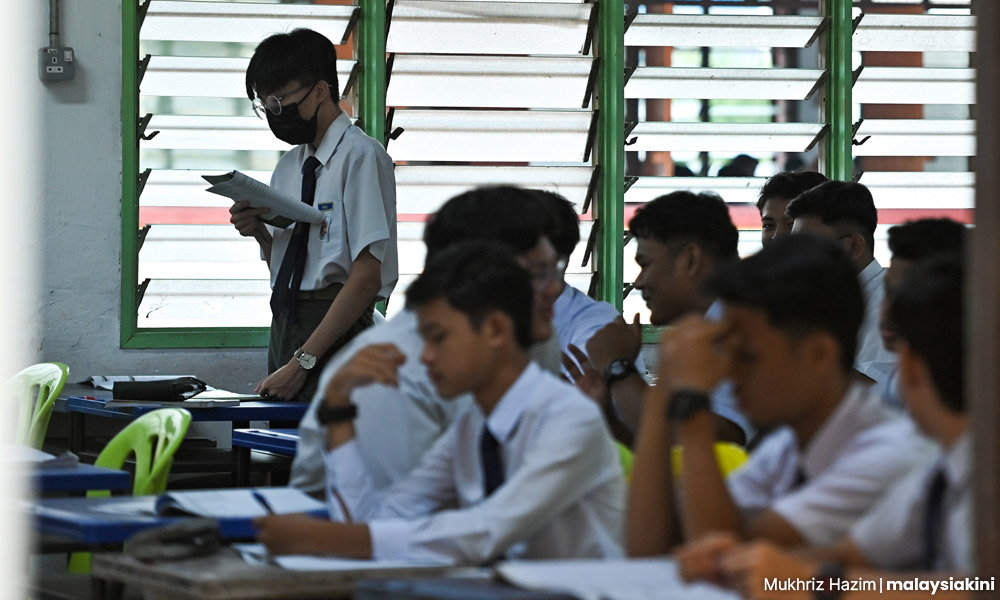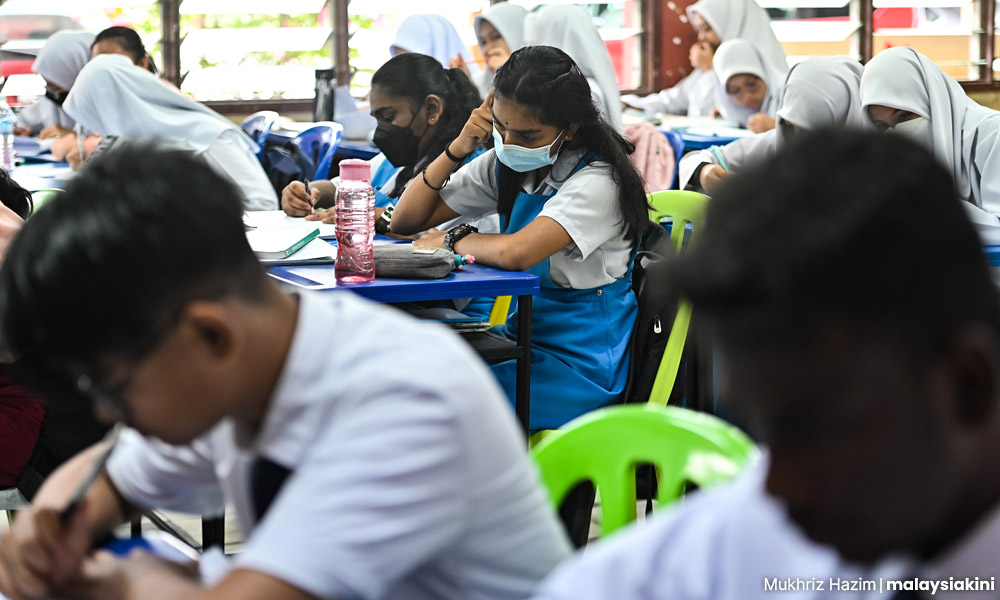Dear Education Minister Fadhlina Sidek, as you are fully aware, Malaysia’s future wellbeing and economic competitiveness are greatly dependent on the quality of its human capital, which is primarily shaped by the quality of its education system.
I have been following closely your recent pertinent statements on the daunting and unenviable task of transforming the Malaysian education system.
They include reviving the National Education Advisory Council to help the ministry “in formulating and improving the direction of national education”, addressing the issue of teachers saddled with excessive workload, enhancing the emphasis on soft skills, and considering the reintroduction of the Primary School Achievement Test (UPSR) and the Form Three Assessment (PT3).
What impresses me most is your willingness to consider the views of various stakeholders in enhancing the quality of our nation’s education system.
Need to transform education system
I am sure you are aware that our school system needs immediate and drastic transformation. Just to cite a few international benchmarks, in the 2019 Trends in International Mathematics and Science Study (TIMSS), Malaysia (Form Two students) scored merely 461 in Mathematics and 460 in Science. Whereas students in our neighbour down south, Singapore, scored 616 and 608 respectively.
In the 2018 Programme for International Students Assessment (PISA), Malaysian students scored lower than the OECD average in Mathematics, Science, and Reading. Our students scored 440 in Mathematics, 438 in Science and 415 in Reading. Malaysia ranked 48 out of 79 countries for Mathematics, 49 for Science and 57 for Reading.

Forget about Singapore. A bitter pill to swallow is that Malaysia’s quality of school education even lags behind that of Vietnam (a lower-income nation) by a wide margin.
In the 2018 PISA, Vietnamese students scored 496 in Mathematics, 543 in Science and 505 in Reading. Vietnam ranked 24 for Mathematics, 4 for Science and 13 for Reading.
English proficiency has also markedly deteriorated over time. This is one of the causes of the unemployment (besides the lack of soft skills and the required technical competence) of more than 200,000 Malaysian graduates.
Shockingly, many of our academics (including professors) too have a poor command of the English language as manifested in their published works.
In short, the products of our school system are generally ill-prepared either for higher education or the workplace. Our students lack critical and creative thinking skills because our education system promotes conformity and uniformity. Worse still, they have been “conditioned” to be spoon-fed.
Another area of grave concern is teacher quality. About 46 percent of principals report a lack of qualified teaching staff as a constraint in enhancing teaching quality.
Additionally, researchers from Akademi Kepimpinan Pengajian Tinggi observed 125 lessons in 41 schools across Malaysia. They found that 50 percent of the lessons were delivered unsatisfactorily with a focus on passive and surface learning rather than on active and deep learning, which are necessary to cultivate higher-order thinking skills in students.

We don’t need foreign experts to tell us what ails our education system and how to go about transforming it. What we truly need is for political leaders and policymakers to accept the stark reality of our ailing school system and to have the political will and courage to implement much-needed reforms.
They should not cover up the declining quality of our education using dubious standards or pseudo-nationalistic arguments. The crux of the matter is that over the last four decades, we have sacrificed meritocracy and quality teaching for mediocrity, politics, and an overdose of social reengineering.
Allow me to share my thoughts on what is quality education and how can we make it happen in Malaysia.
Meaning of quality education
To my mind, a quality education is one that promotes the holistic development of students (balanced and well-rounded education), empowers students to optimise their potential (self-actualisation), promotes intellectual calibre (conceptual understanding and higher-order thinking skills), fosters a passion among students for lifelong learning, and helps prepare them for the unknown future (resilience and knowing how to learn).
Simply put, a quality education prepares students to thrive in the dynamic workplace (with core disciplinary knowledge and soft skills) and to function productively and ethically in society, and not just for testing purposes.
Decisive factors
While there are several factors that influence the quality of education in any nation, in my view, five are decisive.
First and the most critical factor in ensuring high-quality education is to practice meritocracy across the board: appointments of the Education Ministry’s personnel, recruitment of teachers, and appointments of school principals.
It is worth noting that our education system in the 1950s until the 1970s was the envy of neighbouring countries because we had high-performing teachers and school principals.
Second, review the desired outcomes of the nation’s education system: What kind of knowledge, skills, values, and personal traits should students have to enable them to thrive in the dynamic workplace of the future and to function productively and ethically in our multi-ethnic society?
It must be emphasised that disciplinary knowledge and technical skills often have little value if one has poor soft skills. Soft skills are generally defined as intra-personal and interpersonal skills and traits that are required to thrive in the workplace.
They are typically categorised into three major clusters – personal competence (e.g., strong work ethics, high self-esteem, integrity, being resilient, managing time successfully, and personal presentation); interpersonal competence (e.g., communication skills, leadership, emotional intelligence, teamwork and managing conflict); and thinking skills (critical thinking, creative thinking, and problem solving, and decision-making skills).
Third, hiring suitable candidates in the teaching profession is extremely important as teacher quality is the most significant school-based factor in determining student performance outcomes.

Research shows that over 30 percent of the variance of school student achievement resulted from professional characteristics of teachers, teaching skills and classroom climate. Indeed, students placed with high-performing teachers are likely to progress three times faster as compared to those placed with low-performing teachers.
Fourth, we must ensure effective school leadership as the quality of school leaders is the second-biggest school-based factor in determining student outcomes, after teacher quality.
Effective school leaders, namely transformational school leadership with a strong focus on instructional leadership, can raise student outcomes by as much as 2025 percent.
Fifth, it is important to adopt an integrated and systemic approach towards ensuring quality education.
Education transformation efforts must encompass clear educational outcomes with a focus on student learning; holistic, broad-based and flexible curricula; emphasis on conceptual understanding, and critical and creative thinking; varied and student-centric instructional strategies; a nurturing school climate (positive teacher-student interaction, sense of caring and loving, cooperative learning, coaching students to optimise their potential); optimisation of e-learning; appropriate assessment and feedback; and forging a meaningful and strong partnership with parents and the community at large.
Pertaining to the revival of the National Education Advisory Council, I trust that you will appoint individuals with relevant credentials and expertise (e.g., e-learning, instructional design, soft skills and assessment), and not those merely with “big names”.
Regarding the UPSR and PT3, I am in favour of reintroducing them. We need standardised nationwide exams to ensure school accountability and a uniform measure to ensure results are fair and comparable.
To conclude, the future wellbeing of our beloved nation is greatly dependent on high-quality education. No amount of education reforms will bring about the desired outcomes without first having quality and dedicated teachers, high-performing school principals, and a nurturing school climate that brings out the best in both students and teachers. - Mkini
Ranjit Singh Malhi has conducted numerous workshops, both locally and overseas, on quality teaching and learning, graduate employability, teaching soft skills effectively, and academic leadership. He is a member of the Advisory Committee of Unesco’s Regional Centre of Quality and Excellence in Education based in Jubail, Saudi Arabia.
The views expressed here are those of the author/contributor and do not necessarily represent the views of MMKtT.




No comments:
Post a Comment
Note: Only a member of this blog may post a comment.